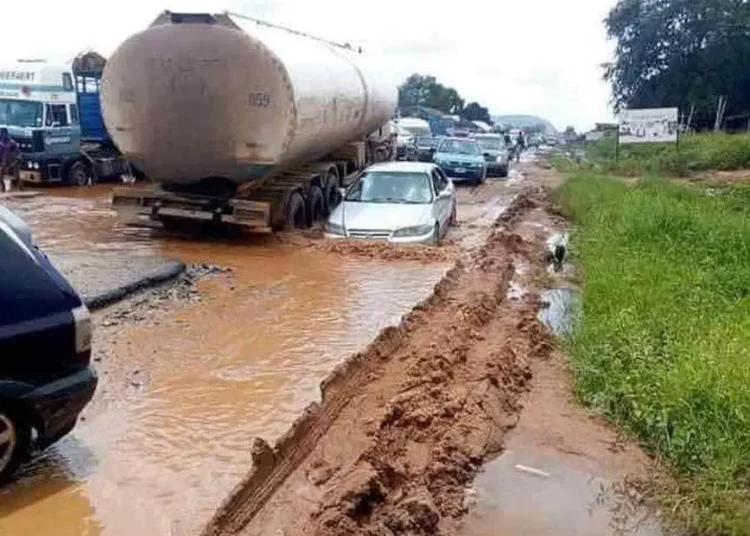The latest report by SB Morgem Intelligence on Nigeria’s road infrastructure presents a horrifying picture of what has become a national emergency.
With 84.6 percent of respondents reporting security incidents along their travel routes and 58 percent viewing the roads as unsafe, our highways have transformed from arteries of commerce into corridors of death.
This systematic collapse of road safety and infrastructure represents not just a transportation crisis, but a fundamental failure of governance that demands immediate attention.
The revelations from the SBM report are particularly disturbing because they highlight how a basic function of modern society – the ability to move safely from one point to another – has become a game of Russian roulette for millions of Nigerians.
When major routes like Port Harcourt-Warri surpass even the notorious Abuja-Kaduna highway in danger levels, we must acknowledge that we have crossed a critical threshold of state failure in protecting citizens’ right to mobility.
The identification of Port Harcourt, Lagos, and Maiduguri as danger hotspots is especially troubling given their strategic importance to Nigeria’s economy. These cities serve as crucial nodes in our national transportation network, handling massive flows of goods and people daily.
When specific locations like Eleme Junction, the Shagamu interchange, and the Lagos-Ibadan Expressway become synonymous with danger, we are witnessing the slow strangulation of our economy’s vital supply chains.
Yet the crisis extends beyond security concerns. The report’s findings on infrastructure decay paint an equally grim picture. When 49 percent of transport operators report significantly higher maintenance costs and shorter vehicle lifespans due to poor road conditions, we are seeing the hidden tax that government negligence imposes on private enterprise.
The fact that 85.7 percent of operators have been forced to raise prices simply to stay in business reveals how infrastructure failure creates a vicious cycle of economic hardship that affects every Nigerian.
The irony is that this crisis persists despite substantial yearly budgets allocated for road construction and maintenance.
This disconnect between expenditure and results raises serious questions about the efficacy of our public spending and the transparency of road construction contracts.
Where exactly are these billions going when our roads remain death traps? The answer likely lies in the murky waters of corruption and mismanagement that have become hallmarks of public infrastructure projects in Nigeria.
The economic implications are staggering. Beyond the immediate costs of vehicle maintenance and increased transport fares, we must consider the broader impact on productivity and economic growth.
When businesses cannot reliably move goods, when workers spend hours trapped in traffic on deteriorating roads, when farmers cannot get their produce to market safely – we are witnessing the systematic undermining of our national productivity.
The billions lost annually in productivity and resources represent a self-inflicted wound on our economy that we can ill afford.
More tragic still is the human cost. The report’s reference to “countless lives lost in preventable accidents” should shake us out of our collective complacency. Each statistic represents a family torn apart, dreams shattered, and potential unfulfilled.
In the considered opinion of this newspaper, the normalisation of death on our roads represents a moral failure that should weigh heavily on the conscience of those charged with ensuring public safety and infrastructure maintenance.
The solution to this crisis requires a multi-faceted approach. First, there must be an immediate security response to protect travelers on our most dangerous routes. This means not just increased police presence but smart deployment of technology for surveillance and rapid response to incidents. The success in reducing incidents on the Abuja-Kaduna route shows what is possible with focused security intervention.
Second, we need a comprehensive audit of road infrastructure spending over the past decade. The disconnect between budgetary allocations and road conditions suggests systematic leakage that must be plugged. This audit should be followed by a transparent, technology-driven system for monitoring road construction and maintenance projects.
Third, the government must embrace public-private partnerships in road infrastructure development. The current model of purely government-funded road projects has clearly failed. We need to leverage private sector efficiency while ensuring public oversight and affordable access.
Fourth, there must be accountability for failure. Officials responsible for road maintenance must face consequences when roads under their purview deteriorate to dangerous levels. The era of treating road maintenance as a casual responsibility must end.
The SBM report’s conclusion calling for a collaborative approach involving government agencies, private stakeholders, and communities points the way forward.
However, collaboration without accountability will merely perpetuate the current crisis. We need clear metrics for success, transparent reporting of progress, and consequences for failure.
As Nigeria grapples with multiple challenges, the state of our roads represents a crisis we can no longer ignore. Every day we delay addressing this emergency, we pay in lost lives, squandered resources, and diminished economic potential.
The question is not whether we can afford to fix our roads, but whether we can afford not to. The death trap that our road network has become is not just a transportation issue – it is a national emergency that demands immediate, decisive action.
We’ve got the edge. Get real-time reports, breaking scoops, and exclusive angles delivered straight to your phone. Don’t settle for stale news. Join LEADERSHIP NEWS on WhatsApp for 24/7 updates →
Join Our WhatsApp Channel










